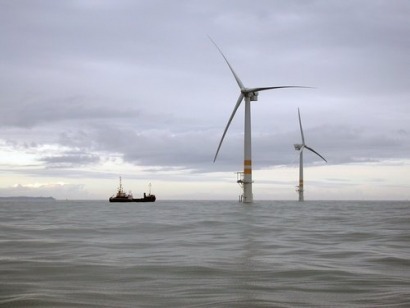
Cambridge Econometrics carried out the study for WWF and Greenpeace and the resulting report reveals that UK GDP will be £20 billion higher in 2030 if investment is focussed primarily on offshore wind rather than on gas. It also predicts thousands of extra jobs in the industry in the near future.
The report arrives on the eve of the Chancellor’s Autumn Statement on the economy in which George Osborne is widely predicted to announce the construction of a number of new gas-fired power stations. The government’s gas strategy report will argue that gas could account for half of the UK’s generation capacity by 2030. However, the Cambridge Econometrics study argues that the UK would save some £8 billion on gas imports on current price trends.
“We keep seeing tangible evidence of the enormous economic and environmental benefits generated by the wind energy” said Maf Smith, Deputy Chief Executive of RenewableUK. “The new report by Cambridge Econometrics provides further proof of this, showing that the offshore wind sector alone will add £20 billion to UK GDP by 2030. The wind industry is already up and running, onshore and offshore. Renewables are already generating nearly 10% of our electricity – with almost half of that coming from wind. The Energy Bill published last week provides a strong framework for this to increase to 30% of our electricity from renewable sources by 2020, with further growth continuing out to 2030.”
The report indicates that even with lower gas prices there are still greater benefits to the economy from offshore wind. This is especially true if the UK was developed as a major centre for offshore wind, thereby attracting investment. At present much of the investment is in equipment that is manufactured abroad.
“The Government is considering what else should be part of this energy mix” Maf Smith added. “Renewable energy is a proven team player which is helping the UK to manage costs and ensure security of supply while also tackling climate change. What’s more, renewables are doing this today. The question is, which other players will be on the team bus? That will be decided partly by their track record. All other technologies will need to pass similar robust tests. Every independent opinion poll this year shows that about two-thirds of the public support renewables and want more wind energy as they’ve already seen the benefits it brings. Fossil fuels, including shale gas, don’t enjoy that level of public support, as people have expressed their concerns about their cost, the environmental damage they do, and the fact that they can only be extracted in limited quantities.”
One of the likely reasons that George Osborne may be so fixated on gas concerns the tax benefits flowing into the Treasury. A gas strategy would attract some £70.4 billion in taxes per year by 2017 with additional revenues from the Carbon Price Floor. No comparable income stream would be available from offshore wind.
Further information:

